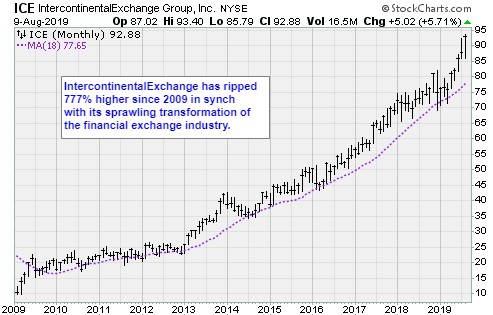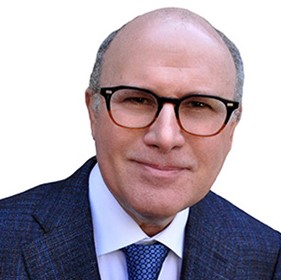This Successful Start-up Conquered the Financial World
Digital transformation brings transparency, speed and a world of opportunity to entrepreneurial companies.
Intercontinental Exchange (ICE), an operator of commodity and stock exchanges, reported spectacular financial results on Aug. 1, and managers have plans to disrupt other lucrative markets soon.
ICE, according to their website, “builds, operates and advances global markets through information, technology and expertise.”
The company’s foundation was set in 1996. Jeffrey Sprecher, a mechanical engineer from Wisconsin, spent $1,000 to buy Continental Power Exchange, an Atlanta electronic energy trading company. Despite the objections of his lawyer, the serial entrepreneur saw a tremendous opportunity in electronic trading.
The company was relaunched in 2000 as ICE when Sprecher gave up 80% of the business to investment bankers Goldman Sachs and Morgan Stanley, according to a 2013 report in the New York Times. With big banks and their customers in tow, the company began competing head to head with Enron, the dominant electronic trading platform at the time.
When the Enron accounting fraud scandal broke in 2001, ICE became the market leader overnight.
During a 2018 podcast, Sprecher revealed he had no experience in financial services. He never worked on Wall Street; he never traded stocks or commodities, for that matter.
But his engineering background taught him to ask questions and take fresh perspectives. He could see how slow, traditional financial markets were about to be disrupted by fast, low-latency software platforms.
He tells the story of flying back from London. While thumbing through the Financial Times, he came across a story on credit default swaps, or CDS. He didn’t know what they were, but he thought there might be an opportunity for ICE to leverage its platform to build an electronic marketplace.
Following the financial crisis in 2008, the company built Clear Credit LLC, a business to remove, analyze and remarket $50 trillion of toxic CDS from banks in exchange for a fee. Bringing transparency and efficiency to that opaque market was instrumental in getting the economy back on track. ICE currently clears 96% of all CDS todays.
Sprecher used the same innovative thinking to engineer the $8.2 billion buyout of the New York Stock Exchange in December 2012. The deal came only seven years after ICE raised $416 million through an IPO on the very same exchange.
In a little over a decade, a tiny Atlanta company went from obscurity to the vanguard of financial markets. Today ICE currently operates 12 regulated exchanges and marketplaces and six clearing houses. The company logged $6.3 billion in revenue in 2018.
Its systems underpin energy futures trading in the U.S., Europe and Middle East. ICE infrastructure is the backbone for high-speed equities and derivative transactions on the NYSE, resulting in greater transparency and more liquidity.
None of this was blind luck. ICE managers saw the roadmap to digital transformation of financial markets way back in the early 2000s. Then they carefully put the pieces together to increase scale and make their platforms foundational.
Now the company is leveraging those capabilities, and its relationship with the biggest investment banks, to bring a variety of new services to the fixed income market. Through strategic acquisitions, the pieces are falling into place. The inflection point is imminent.
ICE acquired BondPoint and the Chicago Stock Exchange in 2018. It added the Bank of America Merrill Lynch global research index business to its fixed income platform in 2017. And in 2016, it bought the credit market analysis business of Standard & Poor’s.
These investments capitalize on at what Sprecher calls “long tail secular trends,” like the digitization of the bond marketa. Getting ahead of the digital transformation of the $11 trillion mortgage market is another multibillion-dollar opportunity for ICE.
The company is also investing in trading infrastructure and risk management for digital assets and payments.
With its roots in regulated financial markets, the company is the logical intermediary for this emergent digital ecosystem. ICE managers expect to collect fees as banks, merchants and consumers tap, swipe and click to whisk money around with the same ease investment managers buy baskets of stocks, bonds and derivatives.
In the interim, ICE’s core businesses are hitting on all cylinders.
Business in its data services and listings remain brisk. Sales of exchange data and analytics, plus fees earned from IPOs on the NYSE, in the second quarter, rose 4% to $664 million year over year. Their trading and clearing businesses also gained 4%, pushing to $634 million. The fixed income segment surged to $80 million in the quarter, up 77% versus last year.
The company also posted 13% growth in free cashflow, and the business is on track for another year of record earnings. Adjusted earnings per share have risen 18% CAGR since 2006, according to the Q2 earnings presentation materials.
In 2017, ICE was named to the Fortune Future 50, which determines the top 50 companies best positioned to adapt and deliver growth in complex environments. In the same year, it was also named a Fortune 500 company. It’s the only exchange operator on the list.
This shows the both the current value and future promise of this game-changing company.
Shares trade at 22.3x forward earnings, and 10.2x sales for a market capitalization of $51 billion. By conventional metrics, the stock may seem expensive. But these measures ignore for the growth paths ahead as new markets develop.
Growth investors should consider using broad-market weakness to accumulate shares.
Best wishes,
Jon D. Markman




